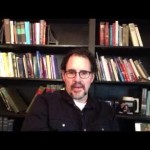We run our website the way we wished the whole internet worked: we provide high quality original content with no ads. We are funded solely by your direct support. Please consider supporting this project.
How do you respond to Acts 13:48?
“When the Gentiles heard this, they were glad and praised the word of the Lord; and as many as had been destined for eternal life became believers.”
If the individual Gentiles who believed were “destined for eternal life” before they “became believers,” some may argue, they obviously were foreknown by God before they became believers. Hence, it seems that the open view of the future is incorrect.
This verse is in my estimation the strongest verse in the Bible supporting individual predestination. All other passages dealing with predestination can and should be interpreted in a corporate sense (see How do you respond to Ephesians 1:4–5? and How do you respond to Romans 8:29-30?). Here, however, the text says “as many as,” thereby ruling out a corporate interpretation. Three things may be said in response to this interpretation of this verse.
First, if this verse presents any difficulty to the open view of future, it poses this same difficulty to anyone who denies that God eternally predestines certain individuals to be saved and leaves others to be damned. Second, since Scripture (and the moral intuition of most people) unequivocally teaches that God loves all and earnestly wants all to be saved (Ezek. 18:23–25, 33:11; John 3:16; 1 Tim. 2:4, 4:10; 1 John 2:2) any interpretation of any verse that suggests otherwise—e.g. by suggesting that God predestined from the foundation of the world some to be saved but not others—must automatically be suspect. And third, if we simply stick to what the verse teaches and refrain from reading into it certain theological assumptions, we will see that it poses no difficulty to the open view and harmonizes perfectly with the biblical theme of God’s universal love.
Note that the text simply says that “as many as were destined for eternal life became believers.” Other than suggesting it was prior to their believing, the verse does not tell us when these people were destined. Nor does it suggest that they were destined simply because God unconditionally chose them. Calvinists assume that this destiny was given to the elect before the world began by sheer divine fiat, but the text simply does not say this. To be sure, there are several other texts which do say that we were predestined before the foundation of the world (Eph. 1:4–5; 2 Tim. 1:9) but the “we” of these verses is a corporate “we.” These verses do not support individual election to salvation (see How do you respond to 2 Timothy 1:9-10?).
Acts 13:48 simply tells us that by the time Paul and Barnabas preached to these Gentiles, some of them had been destined to eternal life. No mentioned is made of a mysterious eternal decree by which some were chosen for salvation and others left to damnation. Just as Judas was destined for perdition when his heart became irrevocably hardened toward God (see How do you respond to John 13:18-19, 17:12?), so these individuals were “destined for eternal life” when their hearts were by grace opened to God.
Scripture teaches us that prior to a person’s conscious decision to put their faith in Jesus Christ, the Father is “drawing” them and the Holy Spirit is working on them to break down walls of resistance and make the soil of their soul fertile (John 6:44, 65; 1 Cor. 12:3). This is why the Lord could tell Paul, “there are many in this city (Corinth) who are my people” (Acts 18:10), though Paul had not yet preached there and there were as yet no believers. So too, Scripture says that the Lord had opened Lydia’s heart, which is why she listened intently to the preaching of the disciples (Acts 16:14). The Father is always looking for people whose hearts may be pliable in his hand (viz. through the Spirit) so he may “destine them to eternal life” by opening up their heart to receive the Gospel
Now, scripture makes it clear that this sovereign work of God can be resisted, for we are free agents even when the God of the universe is knocking on our hearts (Isa. 63:10; Acts 7:51; Heb. 3:8, 15; 4:7, cf. Eph. 4:30). When we persist in our rebellion, our eyes remain blind and our hearts remain dark (2 Cor. 4:4–6). We will not accept the truth of the Gospel. But when our resistance is broken down, our destiny to become believers is settled.
In sum, we see that this verse teaches that God’s move toward us always precedes our move toward him, as in Corinth, and as with Lydia. God had ahead of time prepared the hearts of a number of Gentiles in Antioch to receive the Gospel when Paul and Barnabas preached it. But this verse does not suggest that God eternally predestines and/or foreknows who will and will not believe in him.
Category: Q&A
Tags: Open Theism, Q&A
Topics: Open Theism, Responding to Objections
Verse: Acts 13
Related Reading

What is the significance of Genesis 22:12 ?
Abraham passed God’s “test” (vs. 1) by being willing to sacrifice his son. The Lord says “…now I know that you fear God, since you have not withheld your son…” If the classical understanding of foreknowledge is true, God’s statement “now I know” seems disingenuous. The meaning of God’s explanation for this knowledge — “since…

Summer Q&A!
Greg Boyd and Paul Eddy recently hosted a Summer Q&A for all three services at Woodland Hills Church. If you’ve ever wanted to sit and listen to these guys talk about a wide range of topics off the top of their heads, this is your chance! Good stuff folks! Our friend Jesse Ward was kind…

Don’t Wilberforce’s achievements refute your stance on the separation of faith and politics?
Question: William Wilberforce was a Christian whose passionate involvement in politics almost single-handedly brought an end to the slave trade in 19th century England. Don’t his achievements show the importance of Christians being involved in politics, thus refuting your contention that Christian’s should keep their faith and values separate from politics? Answer: First, while I…

Henry’s Mom: Did God Author This?
Many of you were touched last month when we featured some reflections on little Henry’s death. Well, Henry’s mother Jess has started a blog to process through some of her thoughts and we wanted to share this amazing piece with all of you. Jess thinks ahead to the time when her two-year-old daughter will start…

Free Will: Are studies that demonstrate genetic determinism a threat to free will?
Greg shares his continuing thoughts on free will with a thought experiment (and a hand-drawn graph!) granting that we are largely determined by forces outside of our control. If we grant this presupposition, does that mean that free will is an illusion or insignificant? Find out!

How do you respond to the book of Revelation?
“The revelation of Jesus Christ, which God gave him to show his servants what must soon take place…” (1:1). Because many modern evangelical readers consider almost everything in the book of Revelation to be a sort of “snap shot” about what shall occur at the end of history, it will prove more beneficial to deal…
